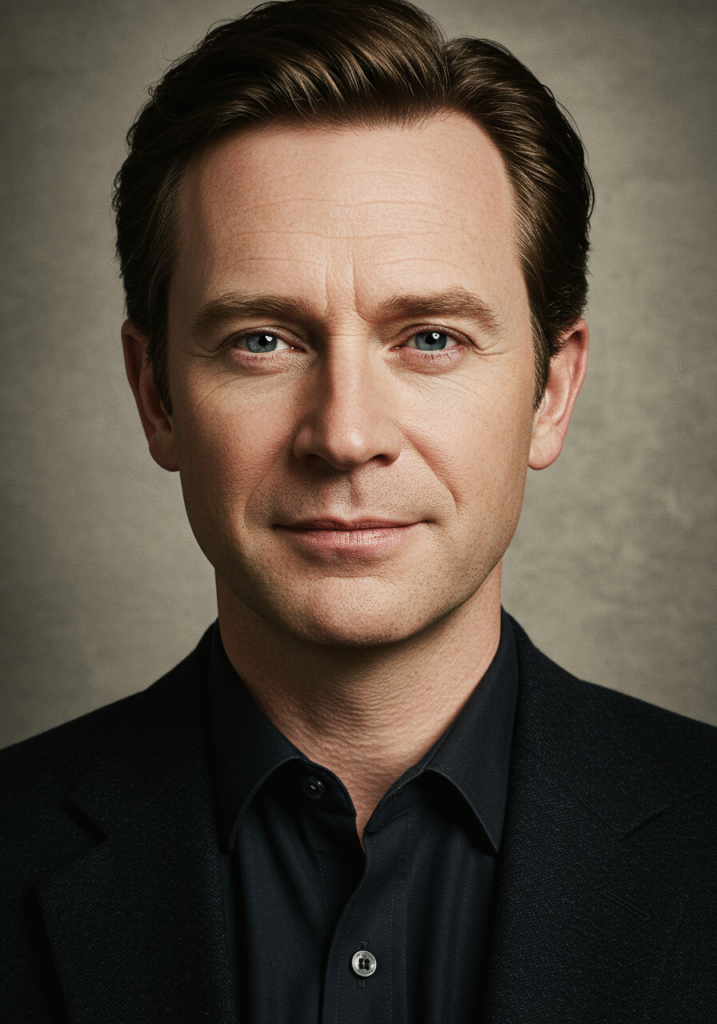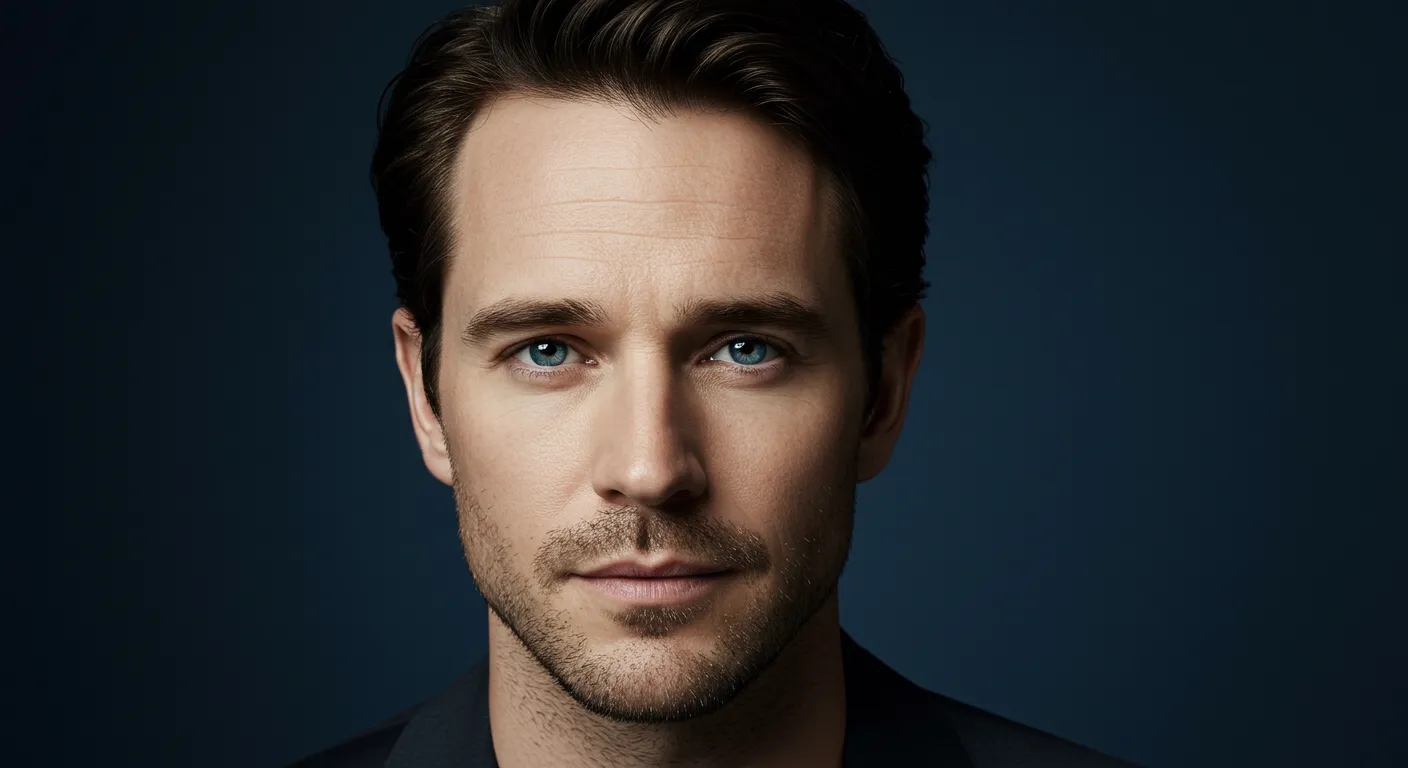Simon Woods The Quiet Genius Behind the Spotlight
Introduction
Simon Woods is not your typical celebrity. A man of quiet depth and rich talent, he has made a name for himself in the spheres of both acting and screenwriting. His presence in British cinema and theatre is marked by roles that range from classical to contemporary, displaying an effortless adaptability. But it’s not just his acting chops that deserve applause—Woods is also a thinker, a writer, and a man who has carved out a distinctive path in the industry without succumbing to the pressures of celebrity culture.
Born on January 7, 1980, in England, Simon Woods has portrayed characters that have become etched into the minds of drama enthusiasts. His portrayal of Octavian in HBO’s Rome and Mr. Bingley in Joe Wright’s adaptation of Pride & Prejudice earned him both critical acclaim and a loyal fanbase. However, Woods is not an actor who chases the limelight. Instead, he seeks roles that challenge conventional narratives and offer something meaningful.
His versatility is what sets him apart. Whether in historical dramas, romantic period pieces, or on the stage performing Shakespeare, Woods brings a rare authenticity that captures audiences. He doesn’t simply play a character; he inhabits them, breathes life into them, and makes them unforgettable.
Simon Woods is more than an actor—he’s a creative force. After gaining recognition as an actor, he stepped behind the scenes to co-write the acclaimed play Hansard, which debuted at the National Theatre in 2019. This move signaled a shift in his career trajectory and confirmed what many had suspected all along: that Woods possesses a brilliant and sensitive mind capable of shaping stories as powerfully as he performs them.

In today’s celebrity-obsessed media culture, Woods remains something of an enigma. He’s not frequently featured in tabloids, nor is he a regular on the talk-show circuit. Yet his influence is substantial, particularly within theatre and LGBTQ+ circles. His personal life, including his marriage to Christopher Bailey, the former Chief Creative Officer of Burberry, is a testament to his authenticity and advocacy by simply living his truth.
Simon Woods may not court attention, but he commands respect. In a world full of fleeting fame, he has built a career of quiet, enduring relevance. And as we dive deeper into his story in the sections that follow, it becomes evident why Simon Woods is someone who not only deserves more recognition but also offers an inspiring blueprint for creative excellence in the modern age.
This article aims to explore the full spectrum of his work, identity, and influence. From his early beginnings to his celebrated works in film and theatre, and from his personal convictions to his understated but powerful advocacy, Simon Woods stands as a modern Renaissance man.
Early Life and Education
Simon Woods’ intellectual and artistic depth did not develop in a vacuum—it was nurtured from a young age through an upbringing steeped in tradition and academic excellence. Born in England in 1980, Woods attended one of the United Kingdom’s most prestigious schools, Eton College. This school has produced numerous influential figures in British society, including politicians, artists, and members of the royal family. For Woods, it was the place where his early interest in literature and performance began to bloom.
After completing his education at Eton, Woods went on to study English at Magdalen College, Oxford. At Oxford, his appreciation for the arts deepened. Surrounded by a stimulating intellectual environment, Woods immersed himself in literature, history, and drama. It was during these formative years that he began participating in university theatre productions—laying the foundation for his future career in acting.
Oxford has long been a breeding ground for actors and writers, and Woods was no exception. Here, he found both mentorship and opportunity. Engaging with the dramatic societies at the university, Woods honed his craft in Shakespearean productions and contemporary plays. These experiences were critical in shaping his nuanced understanding of character development and storytelling.
However, Woods’ early life wasn’t solely defined by academic achievement. Friends and colleagues from his Oxford days often describe him as introspective, witty, and intensely curious. These qualities would later become essential to his success both in front of the camera and behind the scenes as a writer.
Though his journey into professional acting didn’t begin immediately after university—he initially dabbled in journalism—it was clear that storytelling in all its forms was his true calling. His time as a journalist, though brief, helped sharpen his writing skills and fueled his analytical thinking. These traits became apparent later in his playwriting endeavors.
Simon Woods’ educational background gives him a unique edge. His performances often carry an intellectual weight, a sense that he’s deeply contemplated the motives, fears, and desires of the characters he portrays. It’s this combination of scholarly insight and raw emotional expression that makes him such a compelling figure.
Understanding his early life and education helps one appreciate the deliberate, thoughtful way he has navigated his career. Rather than seeking fame or chasing trends, Woods has consistently chosen substance over spectacle—a decision rooted in the values instilled in him during his formative years.
From the classrooms of Eton and Oxford to the world stage, Simon Woods’ journey is proof that a strong intellectual and emotional foundation can produce not just a skilled performer, but a multifaceted artist capable of leaving a lasting impact.

The Rise of Simon Woods
Simon Woods’ rise in British cinema was not meteoric in the traditional sense, but rather a deliberate and refined ascent grounded in intelligence, versatility, and careful role selection. Born in 1980 and educated at Eton College and later Magdalen College, Oxford, Woods carried with him a classical foundation that translated seamlessly into the rich landscape of British period dramas. Early in his career, it was evident that Woods had a particular aptitude for roles requiring depth, restraint, and elegance—a trademark of British storytelling on screen.
His breakthrough came with his role in Pride & Prejudice (2005), where he portrayed the charming yet naïve Mr. Bingley. This role was pivotal not only because it introduced him to a global audience but also because it firmly positioned him within the elite class of British actors who excel at portraying classic literary figures. His chemistry with Rosamund Pike, who played Jane Bennet, was subtle yet powerful—capturing the essence of Regency romance without veering into melodrama. This film’s enduring popularity across streaming platforms continues to cement Woods’ place in the canon of British romantic cinema.
Simultaneously, Woods’ stage presence and vocal command opened doors in theatrical circles, though his on-screen work gained more visibility. British cinema often celebrates actors who can shift between contemporary roles and historical figures, and Simon Woods fit the mold perfectly. His aristocratic demeanor made him a natural choice for roles in period pieces, but he also expressed a desire to branch out—leading him to roles in productions like Cambridge Spies (2003) and Penelope (2006), where he demonstrated a modern sensibility mixed with classic poise.
What made Woods stand out during this time was his ability to embody complexity with minimal expression—a quality often overlooked in a world where dramatic flair is more easily noticed. Directors valued his consistency, attention to detail, and commitment to character immersion. By the late 2000s, Woods had become a reliable name in the industry, albeit one that maintained an air of mystery due to his preference for privacy and a selective approach to roles.
Overall, the rise of Simon Woods in British cinema can be seen as both a nod to tradition and a quiet rebellion against the fame-driven trajectory of many actors. He never sought stardom for its own sake; instead, he cultivated a niche defined by thoughtful storytelling, understated elegance, and timeless appeal.
The Power of Period Dramas
If there is a single genre where Simon Woods has made his most indelible mark, it is undoubtedly the period drama. Often referred to as the crown jewel of British television and film, period dramas require an actor to balance authenticity with emotional restraint. Simon Woods’ success in this genre is no accident—his educational background, refined diction, and classical features have all contributed to his resonance in stories set in bygone eras.
In productions like Pride & Prejudice and Cambridge Spies, Woods demonstrated an uncanny ability to disappear into his roles. He didn’t just act; he embodied the time period, the customs, and the expectations of the characters he portrayed. The art of period acting lies in understanding social structures, unspoken communication, and the intricate choreography of historical courtship—and Woods was a master at all three. Audiences praised him not for flamboyant performances, but for the grace and realism he brought to his roles.
British period dramas demand actors who can carry scenes with silence and stillness as much as with dialogue. In Pride & Prejudice, for example, Mr. Bingley’s internal conflict and longing were subtly conveyed through glances, pauses, and carefully measured speech. Woods’ performance stood in contrast to louder characters, offering viewers a tender, grounded perspective that enhanced the story’s emotional range.
His success in this genre is also due to his willingness to embrace ensemble storytelling. Period dramas are rarely about individual triumphs—they are collective explorations of family, class, love, and society. Woods’ humility as an actor allowed him to seamlessly blend into larger casts without ever losing his individuality. His presence elevated scenes without stealing them, a mark of a seasoned professional.
Furthermore, period dramas often require immersion in the customs and rituals of the time. From horseback riding to ballroom dancing and proper etiquette, these roles are physically and mentally demanding. Woods approached these demands with scholarly precision, committing to dialect coaching and historical research to deliver performances that felt both educational and engaging.
Simon Woods’ contribution to period drama goes beyond performance—it speaks to a cultural preservation of storytelling rooted in history, manners, and emotional complexity. His work stands as a reminder that the genre, when done with care and authenticity, can still captivate modern audiences.
The Intersection of Talent and Identity
Simon Woods’ influence extends beyond acting—he stands as a subtle yet powerful advocate for LGBTQ+ representation in the entertainment industry. In an era where public figures are often scrutinized for their personal lives, Woods has gracefully balanced privacy with authenticity. His long-standing relationship and eventual marriage to Christopher Bailey, the former Chief Creative Officer of Burberry, marked a significant moment in British media, not for its spectacle, but for its quiet normalcy.
By living his truth without turning it into a publicity campaign, Woods helped reshape narratives around LGBTQ+ identity in the entertainment world. In a profession often driven by image management, especially for actors known for romantic or period roles, Woods did not allow conventional expectations to define his personal journey. His example illustrated that an actor can be openly gay, play heterosexual love interests convincingly, and still be embraced by mainstream audiences.
The significance of his openness lies in its lack of fanfare. Woods didn’t “come out” in a press release or magazine feature—he simply lived openly, married the person he loved, and continued his work without exploiting his personal life for attention. This kind of quiet advocacy is incredibly impactful, especially for younger LGBTQ+ individuals seeking representation that feels authentic and dignified.
Moreover, Woods’ partnership with Bailey highlights the intersection of art, fashion, and queerness in modern British culture. Their union brought together two creative forces from different industries who shared values of elegance, discretion, and innovation. Together, they challenged outdated notions of what a successful gay couple could look like—stylish, respected, and deeply private.
While Simon Woods may not be the face of a movement, his visibility matters. In a time when LGBTQ+ representation in media is rapidly evolving, his approach provides an alternative model—one rooted in lived experience rather than activism for headlines. His life and career are testaments to the fact that the entertainment industry is slowly but surely making space for diverse stories and identities.
In essence, Simon Woods stands as a role model not for grand declarations, but for the understated courage of being oneself in a world that often demands conformity.
Simon Woods and the Literary Screen
One of Simon Woods’ most defining traits as an actor is his seamless fit within the world of literary adaptations. From Austen to contemporary reinterpretations, Woods’ career has consistently gravitated toward roles that bridge the gap between literature and film. This pattern isn’t coincidental—it speaks volumes about his intellectual sensibility, artistic taste, and the value he places on storytelling.
Adaptations of literary works require a certain finesse. They ask actors to be custodians of beloved characters while also bringing something fresh and personal to the role. In Pride & Prejudice, Woods not only paid homage to Jane Austen’s creation but also infused Mr. Bingley with a softness and vulnerability that resonated with modern viewers. His portrayal honored the text while elevating the emotional accessibility of the character.
Simon Woods’ success in this space is also linked to his academic background. Having studied English at Oxford, he approaches scripts with an analytical mind, appreciating the layered subtext, symbolism, and character arcs embedded in well-written narratives. This makes him particularly adept at navigating complex source material without diluting its essence for the screen.
Moreover, literary adaptations often carry the pressure of fan expectations. For many audiences, books like Pride & Prejudice are sacred texts, and any deviation from their imagined characters can spark backlash. Woods’ ability to gain approval from both critics and literary purists is a testament to his nuanced understanding of the craft. He doesn’t merely perform; he interprets, translates, and enriches.
In a film landscape increasingly dominated by action franchises and commercial cinema, Woods’ affinity for literary adaptation stands out. It reflects a commitment to artistry, depth, and the cultural value of classic literature. His work keeps these stories alive and accessible for new generations, ensuring that the beauty of the written word continues to thrive on screen.
Through roles that blend literature and cinema, Simon Woods has positioned himself not just as an actor, but as a modern custodian of literary heritage. His performances remind us that some of the most powerful stories ever told still live in the pages of books—and that the right actor can bring them to life with profound beauty.
Simon Woods in Literature
Beyond the screen, Simon Woods’s journey into literature highlights a different facet of his creative expression. His foray into writing, particularly his acclaimed novel The Lightning Tree, shows that his talents go far beyond performing in front of the camera. Woods has proven himself a thoughtful observer of the human condition, with a literary voice that feels both personal and universally resonant.
Woods’s literary style blends introspective narration with sharp observations. The Lightning Tree, published in 2014, received notable praise for its lyrical language, emotional vulnerability, and slow-burning narrative. Set in an aristocratic family’s countryside estate, the novel focuses on themes like memory, identity, class tension, and the fragility of relationships. Much like his acting, Woods writes with a quiet intensity that lingers with readers.
What sets Simon Woods apart as a writer is his ability to infuse authenticity into fictional settings. His background in classics and literature from Oxford gives him a robust understanding of structure, symbolism, and historical perspective. Yet, his work doesn’t feel overly academic or inaccessible. Instead, his prose is crisp, tender, and hauntingly poetic—like an internal monologue that dares to reveal what we all hide.
Woods has mentioned in interviews that writing is a form of catharsis and reflection. His experiences as an actor help him understand character arcs, while his personal life brings raw emotional depth to his themes. It’s also worth noting that Woods, being openly gay, writes from a place of representation and authenticity, weaving identity and emotion subtly through his narratives.
While Woods has yet to publish a second novel, The Lightning Tree remains a strong literary debut. It has cemented his reputation not just as a talented actor, but as a serious writer with a future in fiction. If his next work builds upon this foundation, the literary world should watch closely—Simon Woods’s pen might end up being even more powerful than his performances.
Personal Life of Simon Woods
In an age when celebrities often live under the spotlight 24/7, Simon Woods remains refreshingly private. Despite being in the public eye for much of his career, he has consistently chosen a life away from Hollywood glamor, embracing authenticity and quietude. His personal life reflects values of love, respect, and artistic integrity.
Simon Woods is best known in personal circles as the husband of Christopher Bailey, the former creative director and CEO of Burberry. The couple married in 2012 and are proud parents to two daughters. Their relationship has been widely admired for its stability, elegance, and mutual support. Together, they form a power couple that transcends industries—one in fashion, the other in arts and literature.
Woods and Bailey’s partnership is symbolic in more ways than one. Both have shattered stereotypes, championed LGBTQ+ visibility, and proven that creativity flourishes in environments of love and acceptance. While they keep their children’s lives entirely out of the public domain, it’s known that they prioritize family above fame.
What’s compelling about Simon Woods’s personal life is his strong alignment between values and choices. After finding success in film and television, he gradually stepped back, opting for deeper, more meaningful projects—like writing or select acting roles. He’s not driven by red carpets or awards. Instead, Woods seeks authenticity, both professionally and personally.
He has also been an advocate for mental well-being in the creative community. While not overtly political, his interviews often hint at an awareness of the pressures of fame and the need for grounding. His calm demeanor, intellectual depth, and emotional intelligence make him a unique figure in the entertainment industry.
In many ways, Woods’s personal life offers a blueprint for sustainable success: staying true to oneself, surrounding oneself with love, and choosing purpose over publicity.
Simon Woods’s Cultural Impact
While Simon Woods may not be a household name in the way some actors are, his cultural impact is surprisingly wide. From film and literature to LGBTQ+ representation and arts advocacy, Woods has left a quiet but meaningful legacy.
In the world of period dramas, his portrayal of Charles Bingley in Pride & Prejudice set a benchmark for gentle masculinity. Unlike many portrayals of male characters in period pieces, Woods gave Bingley heart, nuance, and depth. This performance, though often overshadowed by co-star Matthew Macfadyen’s Mr. Darcy, helped redefine how romantic leads can be portrayed—kindness as strength rather than weakness.
In LGBTQ+ representation, Woods has been a dignified and powerful figure. His open marriage to Christopher Bailey, conducted with grace and without media theatrics, has offered inspiration to many young creatives navigating identity in public spaces. Without loud statements, Woods has made it clear that love is love—and that success doesn’t require hiding who you are.
As a writer, Woods’s influence continues to grow. Literary circles praise his work for its elegance and emotional depth. While only one novel has been published, it’s already become a cult favorite among literary fiction enthusiasts. His cross-disciplinary impact—spanning acting, writing, and LGBTQ+ advocacy—cements his place as a multifaceted figure in contemporary culture.
Moreover, Woods represents a new kind of artist. He doesn’t chase trends or followers. His artistry is grounded in integrity, precision, and heart. Whether on stage, on the page, or in personal relationships, Simon Woods leads by example. That is perhaps the most enduring impact of all.
Simon Woods Today
As of now, Simon Woods continues to live a life centered around creativity, family, and personal fulfillment. While he hasn’t returned to mainstream acting in recent years, he remains a respected figure in the literary and artistic community. Fans and critics alike often wonder—what’s next for this multi-talented star?
Rumors of a second novel occasionally make headlines, though no official confirmation has been made. However, sources close to Woods suggest he continues to write and explore different forms of storytelling. Whether it’s fiction, screenwriting, or even theatre, Woods is constantly sharpening his craft. He has also been quietly involved in mentoring young artists and writers, helping them navigate the often treacherous waters of creative industries.
In terms of media appearances, Simon Woods chooses his moments carefully. When he does speak, it’s with clarity, humility, and depth. He prefers meaningful dialogue over media soundbites—another reason his following continues to grow organically rather than virally.
Fans of Pride & Prejudice and Rome still revisit his iconic performances, keeping his legacy alive through streaming platforms and fan communities. Meanwhile, The Lightning Tree continues to find new readers year after year, proving that quality work always endures.
What’s certain is that Woods’s journey is far from over. Whether it’s a return to acting, another literary masterpiece, or a role behind the scenes, Simon Woods remains a name worth watching. His commitment to authenticity in every endeavor ensures that whatever he chooses to do next, it will be deeply felt, thoughtfully created, and uniquely his.
FAQs
Who is Simon Woods?
Simon Woods is a British actor, playwright, and writer, best known for his role as Charles Bingley in Pride & Prejudice (2005) and for his critically acclaimed play Hansard. Beyond acting, he is celebrated for his intellectual pursuits and contributions to theater.
What made Simon Woods famous?
Woods rose to prominence with his performance in Pride & Prejudice and Rome on HBO. His charming screen presence and nuanced portrayals quickly gained him recognition among critics and audiences alike.
Has Simon Woods stopped acting?
While Simon Woods has taken a step back from mainstream acting, he hasn’t officially announced a retirement. His focus in recent years has shifted toward writing and theater, especially with the release of his play Hansard.
What is Hansard about?
Hansard is a two-character political play that explores a married couple’s ideological differences set against the backdrop of 1980s British politics. It’s witty, sharp, and emotionally intense—highlighting Woods’ skills as a playwright.
Is Simon Woods married?
Yes, Simon Woods is married to Christopher Bailey, the former creative director of Burberry. Their relationship is admired both for its strength and for their mutual support of each other’s professional pursuits.
Conclusion
Simon Woods is a rare gem in the world of entertainment—a figure who bridges the intellectual and the artistic, the classic and the contemporary, with remarkable poise. As an actor, his performances reflect emotional intelligence, measured elegance, and subtle depth. As a writer, his intellect and emotional resonance shine through with literary flair. And as a person, his commitment to authenticity, privacy, and purpose elevates his legacy far beyond the screen.
Looking back at his acting career, Woods demonstrated an uncanny ability to adapt to roles that demand more than mere charm or good looks. His portrayal of Charles Bingley in the 2005 adaptation of Pride & Prejudice is often cited not just for its romantic allure but for its emotional sincerity and layered vulnerability. This wasn’t just a polished period piece performance—it was a character study that captured the inner struggle between societal expectations and genuine affection. Woods brought grace to the screen, making audiences root for Bingley not simply as a romantic foil, but as a genuinely empathetic human being.
However, Simon Woods didn’t limit himself to on-screen appearances. With a bold pivot into writing, he embraced another side of his creative identity. His work as a playwright reveals a deeper understanding of character psychology, power dynamics, and moral ambiguity. In Hansard, he offered a sharp, biting, and timely political commentary that didn’t scream but whispered truths that stayed with the audience. It solidified his standing as a thinker and provocateur, someone unafraid to challenge norms and dissect the intricate mechanics of dialogue and decision-making.
What truly sets Woods apart is his refusal to conform to the celebrity culture that dominates modern media. His minimal social media presence, careful selection of public engagements, and focus on intellectual pursuits make him something of a unicorn in today’s fame-driven ecosystem. He isn’t interested in being everywhere—he’s more concerned with being impactful where it counts. This deliberate career crafting may seem subtle, but it’s a masterclass in longevity, integrity, and purpose-driven artistry.
As the entertainment landscape evolves, the value of talents like Simon Woods becomes ever more evident. In an era obsessed with virality and visibility, his approach is a refreshing countercurrent—reminding us that depth, thoughtfulness, and substance still matter. Whether he chooses to act again, publish more plays, or continue in quieter roles behind the curtain, his contribution remains irrefutable and quietly revolutionary.
Simon Woods is not just a name; he’s a movement toward intentional creativity. And in a world that often rewards noise over nuance, Woods stands as a timeless example of elegance, intellect, and enduring relevance.







